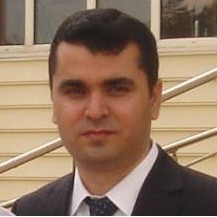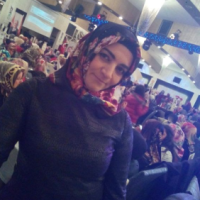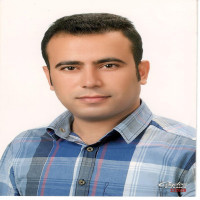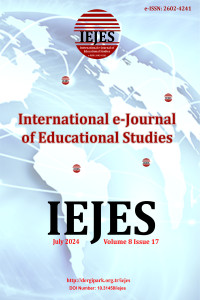Research Article
Review Article
Issue Reviewers



Aysel ARSLAN, Sivas-Türkiye'de doğdu. İlkokulu Sivas'ta okudu. Ortaokul ve liseyi açık öğretim programlarından tamamladı. Lisans eğitimini 2010-2014 yılları arasında Sivas Cumhuriyet Üniversitesi Türkçe Öğretmenliği Bölümünde tamamladı. Yüksek Lisans eğitimini 2014-2017 yılları arasında Sivas Cumhuriyet Üniversitesinde, doktora eğitimini 2017-2021 yılları arasında Atatürk Üniversitesinde Eğitim Programları ve Öğretim Anabilim Dalında tamamladı. 2023 yılında alanında Doçent unvanını aldı. 2017-2018 yılları arasında Gaziantep Şahinbey merkez ilçede Türkçe Öğretmeni olarak görev yaptı. 2018-2022 yılları arasında Sivas Cumhuriyet Üniversitesi Sağlık Hizmetleri MYO'da öğretim görevlisi olarak, 2022-2023 yılları arasında Sivas Cumhuriyet Üniversitesi Eğitim Fakültesi, Eğitim Bilimleri Bölümünde Dr. Öğr. Üyesi olarak, 2023 yılından itibaren Doçent olarak görev yapmaktadır. Alanında çok sayıda makale, bildiri ve kitap bölümü yayınlamıştır. Evli ve iki çocuk annesidir.

Mr. Bilal Ahmad Bhat was born in Kulgam (Rice Bowl of Kashmir) in the Union Territory of Jammu and Kashmir, India and is currently pursuing Ph.D in Education from the University of Kashmir Srinagar. He has done M.A Education, M.ED, M.phil Education, and also qualified JK SET and has published more than seven papers at National and International level. He has also participated and presented more than Fifteen papers at National and International Seminars, Conferences and workshops and having many Institutional, National and International certificate courses to his credit. Besides having worked as Research Assistant in Central University of Kashmir, he is currently resource person for a number of Educational institutions. He has completed one Minor Research Project from Institute of Advanced Studies in Education, Cluster University Srinagar. He has also participated in more than 15 workshops at institutional, national and international level. He has also participated in more than 13 Faculty development programs. He is also Reviewer/Editorial Board Member of Nine international Peer Reviewed Journals. He has also participated in more than 60 webinars, Seminars, Conferences. He has also participated and qualified 30 Quiz Competitions at institutional/national and international level.

Lisans Eğitimi: Sosyal Bilgiler Öğretmenliği
Yüksek Lisans Eğitimi: Sosyal Bilgiler Eğitimi
Doktora Eğitimi: Sosyal Bilgiler Eğitimi



PEDAGOGY & EDUCATION Areas of interest and research: Educational Sciences, Philosophy, Anthropology, Cultural studies. My undergraduate studies comprise the degree in Engineering and Bachelor of Divinity from London University, United Kingdom of Great Britain. These were followed by postgraduate courses in Philosophy of Culture and Ph.D. in Philosophy and Education as well as the Teaching Certificate from Bucharest University, Romania. I have experience as a teacher of various subjects( Technology, English language, and Social sciences in the compulsory education ( secondary school and high school) and since 2001 I teach in the University „Constantin Brâncusi” from Târgu –Jiu, the following subjects to undergraduate programmes: (1)PRE-SCHOOL AND PRIMARY SCHOOL PEDAGOGY (degree level): Fundamentals of pedagogy Theory and methodology of curriculum Theory and methodology of instruction Theory and methodology of evaluation Alternative pedagogies(Montessori, Waldorf, Step by step) Observative pedagogical practical training (2) Within the DEPARTMENT FOR TEACHERS’ TRAINING I teach the following subjects to Level 1 and Level 2 ( programme for teachers for compulsory education, tertiary and university level) from the psycho-pedagogical programme for teaching career: • Pedagogy 1(Introduction to pedagogy & Theory and methodology of curriculum) • Pedagogy 2(Theory and methodology of instruction & Theory and methodology of evaluation) • Methodology of educational research, • Management of educational organizations, • Design and management of educational programmes. I am also involved as specialist in education in various training programmes for teachers according to the educational policy for continuous training of teachers. I also teach in post-graduate/master programmes . Other training courses include: Framework Programme 6(FP 6), internal auditor, and trainer. The teaching experience include secondary, high-school and university level, also I have taken part in training programmes for teachers as trainer and expert on Education. I have attended various scientific events such as international conferences (Hungary, Italy, Turkey, Greece), national conferences with international participation and national. I have published translations from English language into Romanian, chapters in books, working notebooks for students, papers presented at various conferences. I have attended Erasmus+ mobilities training and teaching in Turkey at various universities(Bolu, Nigde, Eskisehir, Kuthaya-Dumlupinar, Adyaman, Malatya), Slovakia, Albania. I have experience as a reviewer for various publications.

Aim & Scope
International e-journal of Educational Studies (IEJES) aims to provide a forum for original and theoretical and research-oriented studies in education to improve the quality of research and to encourage mutual sharing of national and international academic research. The journal aims to contribute to the academic culture by sharing research, knowledge and approaches in Educational Sciences. The journal publishes fully refereed papers which cover applied and theoretical approaches to the study of education. Articles should constitute original research and should be methodologically sound, theoretically informed, and of relevance to an international audience. The fact that the quality of academic studies is monitored as well as their quantity increases the value of scientific studies. For this purpose, the dedication and efforts of the reviewers of our journal are of great significance and importance for us. The devoted efforts and contributions would highly contribute to the journal's status on national and international platforms. The journal is interested in research that aims to inform educational practices.
IEJES, more specifically, accept papers mostly on the subjects listed below:
Early Childhood, K-12, University/College Education; Cognitive, Affective, Social and Cultural Aspects of Teaching and Learning; Teacher Training/Education, Preservice Teachers; Teacher Professional Development; Curriculum Development in Education; Measurement and Assessment in Education; Educational Technology, ICT in Education; Educational Administration and Supervision; Education Policy and Leadership; Didactic/Pedagogical Issues; Teaching/Learning Strategies; Methodologies for Educational Research; Distance Education, E-Learning, Blended Learning; Educational Psychology; Guidance and Counseling; Mathematics Education; Science Education; Special Education; Art Education; History Education; Environmental Education;Statistics Education; Language Education;Music Education; Medical Education; Reading Education
Author Guidelines
Submission
IEJES_English_Manuscript_Template
International e-journal of Educational Studies (IEJES) is an international, double peer-reviewed, free of charge journal covering the full scope of both education and educational studies. Manuscripts should be submitted by one of the authors of the manuscript as online submission after registration to the IEJES. Microsoft Word (.doc, .docx, .rtf), files can be submitted. There is until 40 page limit. If there is a problem while uploading the files of manuscript, please try to reduce their file size, especially manuscripts including embedded figures. Submissions by anyone other than one of the authors will not be accepted. The submitting author takes responsibility for the paper during submission and peer review. If for some technical reason submission through the online submission system is not possible, the author can iejes.editor@gmail.com for support.
Terms of Submission
Papers must be submitted on the understanding that they have not been published elsewhere (except in the form of an abstract or as part of a published lecture, review, or thesis) and are not currently under consideration by another journal. The submitting author is responsible for ensuring that the article’s publication has been approved by all the other coauthors. It is also the authors' responsibility to ensure that the articles emanating from a particular institution are submitted with the approval of the necessary institution. Only an acknowledgment from the editorial office officially establishes the date of receipt. Further correspondence and proofs will be sent to the author(s) before publication unless otherwise indicated. It is a condition of submission of a paper that the corresponding author permit editing of the paper for readability. All enquiries concerning the publication of accepted papers should be addressed to iejes.editor@gmail.com Please note that IEJES uses iThenticate software to screen papers for unoriginal material. By submitting your paper to IEJES are agreeing to any necessary originality checks your paper may have to undergo during the peer review and production processes. Upon receiving a new manuscript, the Editorial office conducts initial pre-refereeing checks to ensure the article is legible, complete, correctly formatted, original, within the scope of the journal in question, in the style of a scientific article and written in clear English. Any article that has problems with any of the journal criteria may be rejected at this stage.
Peer Review
This journal operates double-blind review process. All contributions will be initially assessed by the editor for suitability for the journal. Papers deemed suitable are then typically sent to a minimum of two independent expert reviewers to assess the scientific quality of the paper. The author is required to upload the revised article to the system within 15 days by making the corrections suggested by the referee. The article will be rejected if there are no fixes in it. The Editor is responsible for the final decision regarding the acceptance or rejection of articles. The Editor’s decision is final.
Title and Authorship Information
The following information should be included
Paper title: The title of the study should reflect the content clearly. Except for the linkers, each word should be capitalized
Full author names
Full institutional mailing addresses
Corresponding address
Email address
Abstract: The manuscript should contain an abstract. The title should be followed by an abstract of 150-250 words and 3 to 5 keywords.
Keywords: Keyword 1, keyword 2, keyword 3 (keywords should not exceed 3- 5 words)
1. INTRODUCTION
Titles of the sections should be capitalized. Problem needs to be clearly stated in the introduction part. The introduction should be followed by method, findings, discussion and results respectively.
Page Style: All the sections after this point should be written in Times New Roman font with size 11 and single-spaced. Articles that fail to comply with the publication rules will be returned to the authors without being sent to referees. Margins should be set as top & bottom: 2,5 cm and left & right 2,5 cm. The title should be followed by an abstract of 150-250 words and 3 to 5 keywords. Footnotes should be avoided and endnotes kept to a minimum. All pages should be numbered. References should follow American Psychological Association (APA) (Seventh Edition) style.
Paper template: Author(s) might use this template for their paper(s) (click the icon to download, and edit the template).
Tables and captions to illustrations: Tables must be typed out on the same document. Tables and figures should be numbered. The approximate position of tables and figures should be indicated in the paper. Captions should include keys to symbols.
Figures: All diagrams and photographs are termed “Figures” and should be numbered consecutively. Figures should be given short descriptive captions.
1.1. Second Level Subtitles Should Be in Lower Case
All subtitles should be in lower case, bold and in accordance with the above format. As is here, in other sub-sections, the same format needs to be considered.
1.1.1. Third-level subtitles should be in lowercase
Symbols for variables, marks, labels, etc. must be identical in the text, equations, figures, tables, and nomenclature. Variables must be in italics style.
Tables in the article should be like the following example in terms of format. It must reflect the content; the title of the table should be placed on the top, aligned to the left, and bold.
Table 1. Each word of the table subtitle should be in lowercase (Font size:10)
| n | ||
Class | 1. | 47 | 30.3 |
2. | 60 | 38.7 | |
3. | 48 | 31.0 | |
Gender | Female | 117 | 75.5 |
Male | 38 | 24.5 | |
Total |
| 155 | 100 |
2. METHOD
In research articles, the method should be placed here and the above-mentioned principles should be considered.
The research type/model, research group, data collection/tools, validity/reliability, data collection techniques, data analysis, limitations, and ethical committee approval (if necessary) of the research should be explained exhaustively.
3. FINDINGS
In research articles, findings should be given here and the above-mentioned principles should be considered.
The results of the research should be explained with tables, diagrams, graphics, or pictures in a way that supports the aim and problem of the research.
4. DISCUSSION and CONCLUSION
Discussion/conclusion should be written here, and above mentioned principles need to be taken into consideration.
In the conclusion, the main ideas driven by the discussions should be explained
Suggestions that are suitable for the discussion and results of the research must be made.
5. REFERENCES
You should be prepared according to APA 7 – Citation Guide. The in-text references should be given in a way that accords with the language of the full text. For English manuscripts English referencing guidelines should be observed.
Acknowledgment
Generally the last paragraph of the paper is the place to acknowledge people (dedications), places, and financing (you may state grant numbers and sponsors here).
Preparation of Figures
Each figure can be integrated into the paper body or separately uploaded and should be cited in a consecutive order. Figure widths can be 4-6 inch as 300 dpi. The labels of the figures should be clear and informative.
Preparation of Tables
Tables should be cited consecutively in the text. Every table must have a descriptive title and if numerical measurements are given, the units should be included in the column heading. Tables should be simple with simple borders and text are written as left text.
Proofs
Corrected proofs must be returned to the publisher within 2 weeks of receipt. The publisher will do everything possible to ensure prompt publication. It will therefore be appreciated if the manuscripts and figures conform from the outset to the style of the journal.
Copyright
Open Access authors retain the copyrights of their papers, and all open-access articles are distributed under the terms of the Creative Commons Attribution License, which permits unrestricted use, distribution, and reproduction in any medium, provided that the original work is properly cited.
The use of general descriptive names, trade names, trademarks, and so forth in this publication, even if not specifically identified, does not imply that these names are not protected by the relevant laws and regulations.
While the advice and information in this journal are believed to be true and accurate on the date of its going to press, neither the authors, the editors, nor the publisher can accept any legal responsibility for any errors or omissions that may be made. The publisher makes no warranty, express or implied, with respect to the material contained herein.
Ethical Guidelines
New methods and ethically relevant aspects must be described in detail, bearing in mind the following:
Human Experiments. All work must be conducted in accordance with the Declaration of Helsinki (1964). Papers describing experimental work on human subjects who carry a risk of harm must include:
A statement that the experiment was conducted with the understanding and consent of the human subject.
A statement that the responsible Ethical Committee has approved the experiments.
Submission Preparation Checklist
As part of the submission process, authors are required to check off their submission's compliance with all of the following items, and submissions may be returned to authors that do not adhere to these guidelines.
The submission has not been previously published, nor is it before another journal for consideration (or an explanation has been provided in Comments to the Editor).
The submission file is in Microsoft Word document file format.
Where available, URLs for the references have been provided.
The text is single-spaced; uses an 11-point font; employs italics, rather than underlining (except with URL addresses); and all illustrations, figures, and tables are placed within the text at the appropriate points, rather than at the end.
The text adheres to the stylistic and bibliographic requirements outlined in the Author Guidelines, which are found in about the Journal.
If submitting to a peer-reviewed section of the journal, the instructions in Ensuring Double Blind Review have been followed.
Ethical Principles and Publication Policy
Publication Ethics and Malpractice Statement
International e-Journal of Educational Studies (IEJES) is a tri-quarterly academic journal published on behalf IEJES by the Tamer KUTLUCA, at Dicle University located in Diyarbakır, Türkiye. At IEJES, we attach high importance to the integrity of our academic content, publication ethics and process as well as maintaining authors’ research integrity. We also do our best to follow the guidelines and resources provided by the Committee on Publication Ethics (COPE) to reach and maintain international publication standards.
This section outlines our basic principles that we apply to our journal, which we believe will be useful for researchers and authors who wish to publish their articles in our journal.
Editorial Board and Editorial Process
IEJES works with experts from a wide range of areas in the context of educational sciences. These experts compose the body of our management board, advisory board and editorial board. These boards are also responsible for recommending, contacting, assigning reviewers, or approving the final version of the manuscripts before they are published. Manuscripts that are submitted for evaluation go under rigorous initial screening for compliance with our publication ethics and malpractice statement under the supervision of the Chief Editor. A list of our other editorial board members can be found here.
IEJES never discriminates against authors, editors or peer reviewers based on personal characteristics or identity. On the contrary, embeds diversity and promotes equity at every stage of evaluation and publication. The Management Board takes good publication practices seriously and follows the guidelines provided by Committee on Publication Ethics (COPE) on publication ethics such as peer reviews, ethical guidelines for peer reviewing, and editing peer reviews. Basically, these good practices may include editorial board participation, edition of peer reviews, managing the relationship between the reviewers, authors and/or editorial board members, sharing of information among editors-in-chief regarding possible misconduct, authorship disputes, ethical editing, and retraction.
Authors and Authors Responsibilities
The authors who submit their manuscripts to “International e-Journal of Educational Studies” are expected to comply with the following ethical responsibilities:
• Author(s) must submit original studies to the journal. If they utilize or use other studies, they must make the in-text and end-text references accurately and completely.
• People who have not contributed to the study at the intellectual level should not be indicated as author.
• If the manuscripts submitted to be published are subject of conflicting interests or relations, these must be explained.
• During the review process of their manuscripts, author(s) may be asked to supply raw data. In such a case, author(s) should be ready to submit such data and information to the editorial and scientific boards.
• Author(s) should document that they have the participants' consent and the necessary permissions related with the sharing and research/analysis of the data that are used.
• Author(s) bears the responsibility to inform the editor of the journal or publisher if they happen to notice a mistake in their study which is in early release or publication process and to cooperate with the editors during the correction or withdrawal process.
• Authors cannot submit their studies to multiple journals simultaneously. Each submission can be made only after the previous one is completed. A study published in another journal cannot be submitted to “International e-Journal of Educational Studies”.
• Author responsibilities given in a study (e.g.: adding an author, reordering of author names) whose review process has begun cannot be changed. Authors’ names and surnames, affiliations, e-mail addresses, ORCIDs must be clearly stated as footnotes if their manuscript is accepted and approved for publication.
Peer Review Process
IEJES adopts a double-blind peer review system in which the reviewers do not know each other's name and any other detail. Similarly, the reviewers and authors do not know each other's name or any other detail. Peer review process is completed in 7 steps detailed below.
1. Authors upload their manuscript using the MS Word template with their plagiarism report through DergiPark system.
2. The assigned editor reviews the manuscript and the plagiarism report, and s/he does a second plagiarism analysis with Turnitin or IThenticate software.
3. If the similarity rate is within the range stated by the journal (20% max.), the manuscript is examined by the editorial board in terms of its suitability for the journal's scope. If the manuscript is suitable for the journal’s scope, then the manuscript is examined in terms of writing rules of the journal. If the manuscript does not comply with the writing rules, it is sent back to the authors for correction. After the authors make the relevant corrections, they upload the manuscript to the system. After the positive results of these stages, the blind review starts.
4. Three different reviewers are assigned through the system depending on the subject of their study fields. The reviewers evaluate the research in 15 days. This period can be extended for another 15 days, if necessary. New reviewers are assigned to replace the referees who do not complete their evaluation in 30 days.
5. In the review process, the reviewer evaluation form containing the reviewer’s feedback and the manuscript file with the feedback of the reviewer are sent back to the authors. The author is given 15 days for revision. The revised manuscript form that the authors prepare is forwarded to the reviewers for second evaluation, if required. This process continues until the reviewers make their final decision.
6. The final decisions of the reviewers are evaluated by the editorial board. If the manuscript is accepted, it is sent to the page-setting and then assigned to the relevant issue. At the time of publication of the relevant issue, the accepted manuscript is published online on DergiPark system. If the research is rejected, it is sent back to the author/s with the reasons of rejection.
7. Manuscripts can only be published with the decision of editorial board and at least two referees reporting positive opinions.
IEJES provides its reviewers with an appropriate manuscript management system (DergiPark) that provides help and support to facilitate the review process.
Reviewers are responsible for maintaining an objective evaluation process and they should not have any conflict of interest. Additionally, they are expected to improve the quality of the manuscripts by recommending relevant published work (maybe not yet cited). It is also the responsibility of the editor of the manuscript and the reviewers to treat the assigned manuscript confidentially before publication. Reviewers can also complain about any research issue that they identify including plagiarism, duplicate or concurrent publication, research errors, research standard violations, and undisclosed conflicts of interest directly to the Chief Editor. If this is required, the reviewer(s) should include the details of their complaint and provide evidence to solve the dispute in a short time and effectively.
Open Access Policy
IEJES is a fully open-access journal and it provides free and unlimited access to the articles that it publishes without any form of restriction, subscription, or requirement. This benefit results in higher visibility, readership and citation. An open-access policy also helps disseminate knowledge as widely as possible. Based on its open-access policy, the journal allows readers to read, download, copy, distribute, print, search, or link to the full texts of its articles and allow readers to use them for any other lawful purpose. Thus, IEJES lets researchers remix, adapt, and build upon the articles published on its website non-commercially, as long as they credit IEJES and license their new work under identical terms. All the articles published on the IEJES website are licensed under a Creative Commons Attribution-NonCommercial-ShareAlike 4.0 International License (CC-BY). Because of its open-access policy, IEJES does not allow others to commercially share the articles that it publishes.
Copyright and Access
Authors retain the copyright of their papers without restrictions, but they are responsible for the content of their article published in the journal. Authors also grant IEJES non-exclusive first publishing rights to publish their articles.
Authors confirm that their articles' content does not bind the owner, editor, co-editors, or advisory board members of IEJES.
Authors declare that their articles are original and have not been published previously or are not under consideration of publication elsewhere.
Archiving
IEJES uses DergiPark hosting services and editorial workflow management system provided by TÜBİTAK ULAKBİM. DergiPark system saves each document and manuscript uploaded to the system electronically. Additionally, the editors who are assigned to manage the workflow of manuscripts are individually responsible for saving and backups, which is supervised by the Chief Editor. In the event that IEJES starts to use a different hosting service and an editorial workflow management system, all the backups will be transferred to that system and access to the new website will be preserved.
Publishing Schedule
IEJES is a tri-quarterly electronic academic journal published in April, July, and October.
Price Policy
Articles that apply to the IEJES academic journal are taken in the pre-review stage. Pre-review is done by the editorial board of IEJES. Articles that do not have the necessary permissions, whose plagiarism report is negative, and that are outside the coverage of the journal are rejected. Then, the article review process starts, where there are at least two referees and blind. The decision to publish is taken for those who are successful in the referee process.
All articles published in IEJES are open-access and freely available online, immediately upon publication. This is made possible by an article-processing charge that covers the range of publishing services we provide. This includes the provision of online tools for editors and authors, editors' progress payments, article copyediting, layout editing, liaison with abstracting and indexing services, and customer services.
As a matter of ethics, an Article Processing Charge is paid when the article is uploaded to the journal management system by the author. No editorial evaluation and review process is initiated without payment. This payment does not indicate that the article uploaded by the author will certainly be published. This payment is only related to the article processing process.
As per the resolution passed by the Turkish Higher Education Council at the General Assembly dated March 03, 2019, an article published in IEJES can be included in the applications (declaration) for associate professorship since the journal falls under the clause of "Journals that charge fees -regardless of acceptance/rejection condition- during application".
We would like to share important news with you. International e-journal of Educational Studies indexed in EBSCO Education Full Text Database Coverage List H.W. Wilson Index since January 7th, 2020.
https://www.ebsco.com/m/ee/Marketing/titleLists/eft-coverage.pdf
IEJES has been indexed in the Education Source Ultimate database, which is the upper version of the Education Full Text (H.W. Wilson) and Education Full Text (H.W. Wilson) database, from 2020 to the present.
https://www.ebsco.com/m/ee/Marketing/titleLists/esu-coverage.htm
This work is licensed under a Creative Commons Attribution 4.0 International License.







